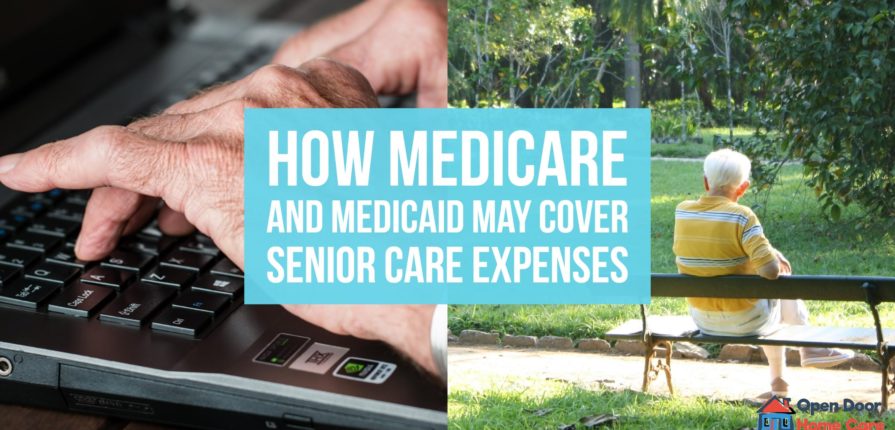Most older adults aren’t fond of an idea of moving into a special nursing home or senior care facility to receive daily support and medical assistance they need due to aging or/and health conditions. They prefer staying at home and preserving the independence for as long as possible. However, if keeping up with the health maintenance and household chores begin requiring skilled assistance, the only way to stick to that preference is getting home care help. When thinking about senior home care and assisted living options, one of the most burdensome questions you have to answer is how to cover the costs. Medicare and Medicaid are the programs that may help with that, but under certain conditions. Let’s determine the difference between these two to understand which kinds of expenses they cover.
What’s Medicare and which senior care services will it cover?
Medicare is quite similar to regular health insurance, but it’s meant for people who’re 65 and older. It has two parts that have their own eligibility requirements: Part A (Hospital Insurance) and Part B (Medicare Insurance). Generally, it’s available to seniors and people with disabilities if they’re receiving/have the right to receive Social Security or Railroad benefits, including the retirement ones. You may find out if you may enroll in Medicare using this online eligibility and premium calculator on the official program website.
Medicare is the program that provides funding for such expenses and helps older adults and their relatives to minimize the financial burden of senior home care. At the same time, the most common misconceptions shared by people looking for the caregiving options for the first time is that the Medicare program is going to pay the entire cost or at least a significant portion of it.
But, in reality, Medicare pays for medically necessary assistance and skilled home health care.
Short-term respite care received in a nursing home after surgery or a dismissal from a hospital, professional nursing care performed by a registered nurse, physical, occupational and speech therapy, assisted living ensured by a caregiver are the services Medicare is supposed to cover.
However, the benefits related to the custodial care or the stay in an assisted living residence are quite limited and won’t be enough to pay the entire price.
For instance, if you or your relative decides to move to an assisted living facility for seniors, he would probably be able to use Medicare funds to pay for certain health services, but not for the actual stay and the expenses related to it. Personal care (such as bathing, feeding, dressing, and grooming) is usually not covered.
Medicare isn’t really the option if a senior requires long-term care either. It may pay for the first 100 days of skilled nursing care if it’s medically necessary (and, bear in mind that only the first 20 days will be totally free), but people with chronic conditions won’t find it suitable. Unlimited part-time medical home care for the homebound elderly may be covered by Medicare, but getting approval is tricky, and it won’t be granted if you or your senior relative is receiving skilled or medical care in an assisted living facility.
How to cover senior home care expenses with Medicaid
When it comes to Medicaid, this joint federal and state program helps seniors with lower incomes to afford health care, including home care and services associated with it. Unlike Medicaid, it covers not only visits to the doctor’s office and hospital expenses, but also pays for long-term senior care provided both at a specialized facility and at home. Thus, if you or your beloved elderly relative needs personal care, non-medical support, and assistance from the visiting nurses, Medicaid will most likely be your resort. Custodial care is something the program pays for as well.
People who need to pay the bills for long-term senior care and have quite limited funds may apply for Medicaid. The qualifications are listed on the official program website. You may also contact the support to figure out the details. But since Medicaid is aimed to ensure medical coverage and assistance to people with lower incomes, the primary requirement one has to meet to be eligible for Medicare is having the income and assets that are not higher than the limit defined by the state.
So, it’s actually the state that has the power to determine whether individuals can be eligible for Medicaid or not. Older adults, who’re already covered by Medicaid and want to use it to pay for senior home care, assisted living or nursing home services, need to go through the second round of state evaluation. Its results will show whether they qualify for long-term care services paid for by Medicaid or not.
The states have a certain degree of freedom when it comes to the Medicaid program. Therefore, it’s necessary to learn local evaluation requirements and coverage rules to understand how much support you may receive. For instance, the State of New York established the Consumer Directed Personal Assistance Program within Medicaid. CDPAP allows family caregivers to receive compensation for the home care services they provide to their senior relative.
If the information regarding these programs and the coverage for senior home care services still sounds a bit confusing to you, please contact Open Door Home Care. We’re an agency licensed to provide home care and related services within the Program in all five New York City boroughs and Nassau County. Our professionals will be glad to consult you on your particular case, help you with receiving the coverage and choosing the most appropriate senior care service package.

